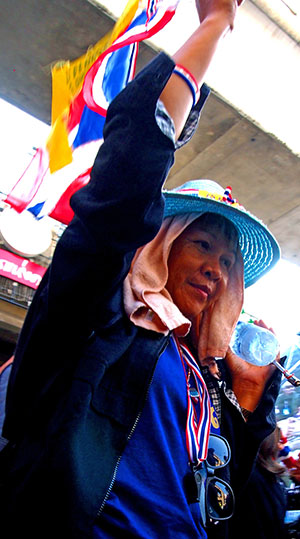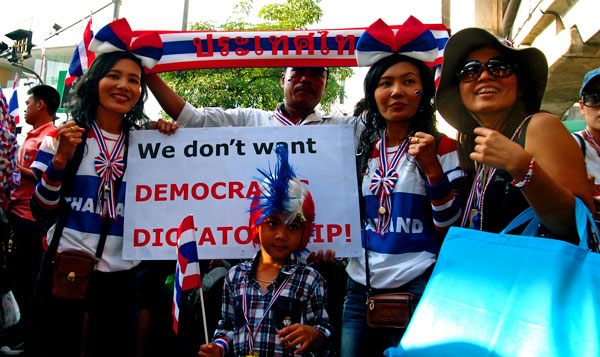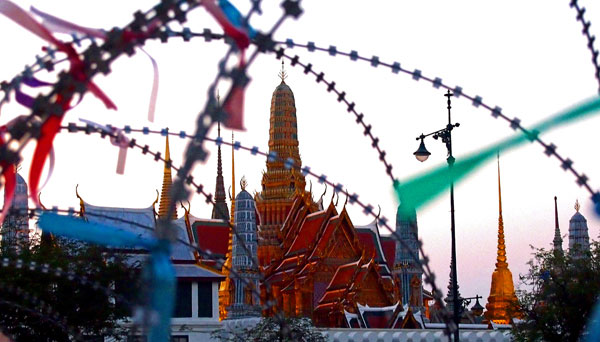
I wake up and turn on the TV in my Bangkok hotel room. The screen lights up with images of armoured vehicles in the streets, running protesters and small explosions. It's Cairo, where street protests surround a constitutional referendum. Outside my Bangkok hotel, the streets are a lot less crazy than is usual in this town. For now, at least.
The Shutdown Bangkok movement has been underway for over a week, as anti-government protesters drawn largely from the middle and upper classes attempt to provoke sufficient chaos to bring on a crisis and, they hope, a military coup.
So far, not so good on that front. The most visible effects so far: Traffic is merely bad instead of insane, and they cancelled the Frankie Valli concert. The government has weathered that.
But bigger trouble is brewing. Yesterday, the government declared a state of emergency. Violence, while not yet widespread, has injured at least 70 and killed one. Many merchants say business is down significantly and tours have been cancelled as governments issue travel warnings. Still, Bangkok is a massive beast, and the protest camps seem more like an annoying cold than a fatal choke-hold.
As for those protest camps, they are definitely the place to be. Approaching the central camp around the huge MBK department store, there is a festival atmosphere. Big screens broadcast speeches from the stage and the protesters' whistles set up a din reminiscent of vuvuzelas at a football match. Vendors are everywhere peddling food and protest trinkets -- whistles, ribbons, shirts, the ubiquitous clappers favoured by Thai protesters of every stripe, and even magnets in the shape of protest leader Suthep Thaugsuban.
Although the anti-government types have long been characterized as "yellow shirts," they have new uniforms now -- the white, red and blue of the Thai flag. (There are also plenty of Guy Fawkes masks and shirts, despite the fact that this crowd is not exactly drawn from the downtrodden and oppressed. As a protest symbol, Guy seems to have jumped the shark.)
'We don't want a democratic dictatorship'
Not everyone is here seeking to topple Thai Prime Minister Yingluck Shinawatra. There's at least a few people here fighting for their right to party. "I'm not really a protest supporter," says AJ, a young student. "I came here to shop and have a look at what's going on."
Two white tourists decked out in full protest gear slouch by in a line of protesters. "We're Russian," one offers, without further explanation.
Marcel is a Dutch traveller who has just taken a turn waving a giant flag. "Oh no, I'm not a supporter," he says. "I just wanted something for my Facebook page."
Although there may be hangers-on around the edges, closer to the stage there is no doubt that participants are committed. There are songs, noisy marches, and call-and-response chanting. "We don't want a democratic dictatorship," reads one sign fronted by a young lad in a spiky red, white and blue mohawk.

"Our protest is not a fight for power, nor a fight against people class," another sign reads. "It is a fight for rightiousness [sic] and anti-corruption!"
Occupy, flipped
If that sounds a little defensive, there's good reason. The protest movement is taking an increasing amount of grief. Comparisons to the Tea Party are common -- the Suthep brigades are essentially a disgruntled electoral minority seeking to undermine a democratic system that has not worked for them of late.
Comprised largely of the middle and upper classes, they are annoyed at the irresponsible rural poor for their habit of voting in the populist Pheu Thai Party of Yingluck Shinawatra and her exiled brother, Thaksin Shinawatra. It's essentially the flip side of the Occupy movement, as if Sarah Palin had led a crowd of anti-Obamacare fanatics to paralyze Washington. This dispute even has its own version of Obamacare -- the government's controversial "rice pledging" program, in which it buys the total crops of Thai rice farmers. Critics claim that the program is a budget-buster that has distorted the rice market and caused a collapse in exports.
Meanwhile, just as Obamacare experienced roll-out problems, the government has alienated farmers with a failure to pay promptly. The courts have announced they will explore corruption issues surrounding the program, summoning the possibility of another judicial coup, a means employed to dispose of democratically-elected governments in the past.
The anti-corruption line is a handy issue in Thailand -- an all-purpose stick that can be used on any politician with a pulse. Protest leader Suthep Thaugsuban, evidently so intent on cleaning up corruption in the Shinawatra regime, was disqualified from serving as an MP in 2009 after being found to be in an unconstitutional conflict of interest; and his previous attempt to mobilize a mass public protest movement in 1995 was intended to defend his reputation after he was tarred in another major corruption scandal. He was also charged with murder over the deaths of red shirt protesters in 2010. As an anti-corruption figure, Suthep ought to have all the credibility of George W. Bush at a peace rally.
Protest party
It's hard to know what's really going on here, because it's hard to know where the power lies. In almost any other city, the barricades around the camps would seem to mark battle lines between protesters and authorities. But in Thailand? No one is sure which side the guns and tanks are on. Strict Thai laws forbid any talk about the role of the king in these situations, but the protesters clearly feel they are the king's brigades, taking on the peasant upstarts of the Shinawatra gang.

On Sunday, I took a stroll toward the Lumphini Park protest camp. All along the closed-off street loudspeakers blared out speeches being made in the park, but the street vibe was anything but strident. As is usually the case at any Bangkok gathering it was a street food extravaganza, and the vendors were as likely to offer Miley Cyrus shirts as the Shutdown Bangkok variety. It was a party.
That evening my hotel TV showed scenes from another protest camp uptown, where a grenade explosion had injured 28 people that same afternoon. History demonstrates that these Bangkok street parties can turn on you. ![]()
Read more: Travel, Rights + Justice















Tyee Commenting Guidelines
Comments that violate guidelines risk being deleted, and violations may result in a temporary or permanent user ban. Maintain the spirit of good conversation to stay in the discussion.
*Please note The Tyee is not a forum for spreading misinformation about COVID-19, denying its existence or minimizing its risk to public health.
Do:
Do not: